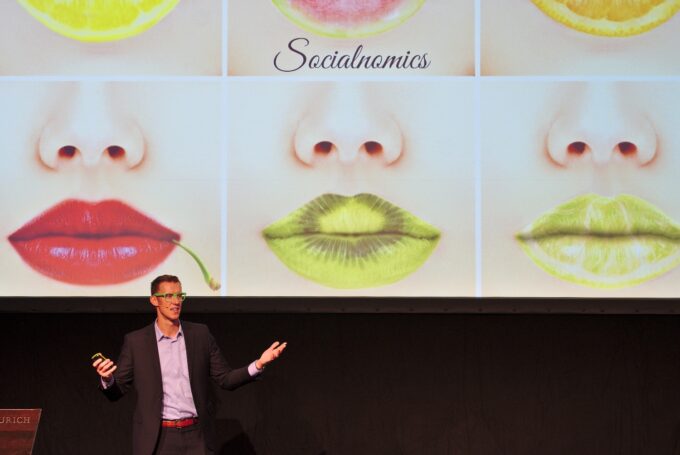Second Digital Economic Forum on Off- and Online Worlds
The digital transformation and disruptive market trends are having both a positive and negative impact on the Swiss economy. Society, including many working models, is also being redefined. For the second Digital Economic Forum, international thought leaders met researchers, classic entrepreneurs met start-ups, CEOs met independent consultants to discuss the digital and analogue worlds.

Andreas Staub, behavioral economist: "So people remain people online."
Switzerland is also undergoing exponential technological change. Speakers and the expert audience at the second Digital Economic Forum (DEF) at the Park Hyatt Zurich agreed that the economy and society are undergoing a digital transformation. The DEF, which attracted over 200 interested parties over two days at the end of April 2016, sees itself as an update on innovations and the significant consequences of digitalisation.
No question, for futurist Gerd Leonhard, technology is changing exponentially. Science fiction is increasingly becoming science fact. In five years, Leonhard predicted, a computer will have the capacity of a human brain. The world will change more in the next 20 years than during the last three economic revolutions.
Offline/Online Existence
The areas of offline and online are also becoming increasingly important, ultimately in order to lead a healthy self-determination at home as well as in the corporate environment. The indirect effects of digitalization are greater than assumed, for example in autonomous mobility on the labor and real estate market. For German crime writer Veit Etzold, it is clear that the digital world is causing ever-shorter attention spans. A recapitulation of a single author in favor of PR areas such as storytelling?
Big Data and Consumer 2.0
Communications specialist Julius Van de Laar explained his strategy for US President Barack Obama's successful 2012 election campaign, which was based on Big Data and tools for integrated campaign management. "No matter what they do, you absolutely have to stay authentic, even on social media," Van de Laar concluded his presentation. Science fiction is a reality today, also stated digital disruption and transformation consultant Kamales Lardi.
She presented the "disruptive consumer 2.0" and other technological trends. The consumer has changed significantly with the technical innovations. The question now is, to what extent have the producers, the companies, also changed? Industries are being drawn into a digital storm, and companies that weather this storm are acting in a consumer-oriented manner and have a major impact on future economic development - says Kamales Lardi.
Coping with the future?
Andreas Krebs, Chairman MERZ Pharmaceuticals, pointed out that at the moment no CEO of the big pharmaceutical companies could convincingly say that his company had a digital strategy. He considered it of great importance that pharmaceutical companies guide patients through the digital world and bring them to the doctor via this path. Behavioural economist Andreas Staub confronted the participants with non-rational decisions. He noted that social preferences remain pronounced and digital anonymity is not relevant: "So people remain people online."
Further interesting topics and theses of the Second Digital Ecnomic Forum can be found at www.digitaleconomicforum.ch









